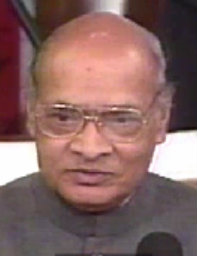P. V. Narasimha Rao
From Wikipedia, the free encyclopedia
| P. V. Narasimha Rao | |
|---|---|
 | |
| 9th Prime Minister of India | |
| In office 21 June 1991 – 16 May 1996 | |
| President | R. Venkataraman Shankar Dayal Sharma |
| Preceded by | Chandra Shekhar |
| Succeeded by | Atal Bihari Vajpayee |
| Minister of Defence | |
| In office 6 March 1993 – 16 May 1996 | |
| Preceded by | Sharad Pawar |
| Succeeded by | Pramod Mahajan |
| In office 31 December 1984 – 25 September 1985 | |
| Prime Minister | Rajiv Gandhi |
| Preceded by | Rajiv Gandhi |
| Succeeded by | Shankarrao Chavan |
| Minister of External Affairs | |
| In office 31 March 1992 – 18 January 1993 | |
| Preceded by | Madhavsinh Solanki |
| Succeeded by | Dinesh Singh |
| In office 25 June 1988 – 2 December 1989 | |
| Prime Minister | Rajiv Gandhi |
| Preceded by | Rajiv Gandhi |
| Succeeded by | V. P. Singh |
| In office 14 January 1980 – 19 July 1984 | |
| Prime Minister | Indira Gandhi |
| Preceded by | Shyam Nandan Prasad Mishra |
| Succeeded by | Indira Gandhi |
| Minister of Home Affairs | |
| In office 12 March 1986 – 12 May 1986 | |
| Prime Minister | Rajiv Gandhi |
| Preceded by | Shankarrao Chavan |
| Succeeded by | Sardar Buta Singh |
| In office 19 July 1984 – 31 December 1984 | |
| Prime Minister | Indira Gandhi Rajiv Gandhi |
| Preceded by | Prakash Chandra Sethi |
| Succeeded by | Shankarrao Chavan |
| Chief Minister of Andhra Pradesh | |
| In office 30 September 1971 – 10 January 1973 | |
| Governor | Khandubhai Kasanji Desai |
| Preceded by | Kasu Brahmananda Reddy |
| Succeeded by | Jalagam Vengala Rao |
| Personal details | |
| Born | 28 June 1921 Vangara, Hyderabad State,British India (now in Andhra Pradesh, India) |
| Died | 23 December 2004 (aged 83) New Delhi, Delhi, India |
| Nationality | Hyderabadi (1947-1948) Indian (1948-2004 death) |
| Political party | Indian National Congress |
| Alma mater | Osmania University Fergusson College |
| Profession | Lawyer Activist Poet |
| Religion | Hinduism |
Pamulaparti Venkata Narasimha Rao (Telugu: పి.వి.నరసింహరావు) (28 June 1921 – 23 December 2004) was an Indian lawyer, politician andfreedom fighter[1] who served as the ninth Prime Minister of India (1991–1996).[2] He led an important administration, overseeing a major economic transformation and several home incidents affecting national security of India.[3] Rao who held the Industries portfolio was personally responsible for the dismantling of the Licence Raj as this came under the purview of the Ministry of Commerce and Industry.[4] He is often referred to as the "Father of Indian Economic Reforms".[5][6] Future prime ministers Atal Bihari Vajpayee and Manmohan Singh would continue the economic reform policies pioneered by Rao's government. Rao accelerated the dismantling of the License Raj, reversing the socialist policies of Rajiv Gandhi's government. He employed Dr. Manmohan Singh as his Finance Minister to embark on historic economic transition. With Rao's mandate, Dr. Manmohan Singh launched India's globalisation angle of the reforms that implemented the International Monetary Fund (IMF) policies to rescue the almost bankrupt nation from economic collapse.[4] Rao was also referred to as Chanakya for his ability to steer tough economic and political legislation through the parliament at a time when he headed a minority government.[7][8]
Narasimha Rao was termed as the best Prime Minister after former PM Lal Bahadur Shastri who crafted India's post-Cold War diplomacy and economic reforms. According to Natwar Singh "Unlike Nehru his knowledge of Sanskrit was profound. Nehru had a temper, PV a temperament. His roots were deep in the spiritual and religious soil of India. He did not need to Discover India". Former President Kalam described Rao as "patriotic statesman who believed that the nation is bigger than the political system". Even APJ Abdul Kalam acknowledged that Rao in fact asked Kalam to get ready for nuclear tests in 1996 but it was not carried out as government at center got changed due to elections and it was later carried out by Vajpayee led NDA government. In fact Rao briefed Vajpayee on nuclear plans. Rao's term as Prime Minister was an eventful one in India's history. Besides marking a paradigm shift from the industrialising, mixed economic model of Jawaharlal Nehru to a market driven one, his years as Prime Minister also saw the emergence of the Bharatiya Janata Party (BJP), a major right-wing party, as an alternative to the Indian National Congresswhich had been governing India for most of its post-independence history. Rao's term also saw the destruction of the Babri Mosque in Ayodhya in Uttar Pradesh when BJP's Kalyan Singh was CM which triggered one of the worst Hindu-Muslim riots in the country since its independence.[9] Rao died in 2004 of a heart attack in New Delhi. He was cremated in Hyderabad.[10]
ReplyDeleteAt the Personal Injury Attorney Firm, we offer our finest facilities in supporting you to claim the rightful compensation along with providing the reasonable justice for you. If the personal injuries occur due to the negligence of the other party, we can acquire specific payment depending on the losses assessed, the injury occurred, and other factors such as property damage, etc. Call @+1-727-410-8468